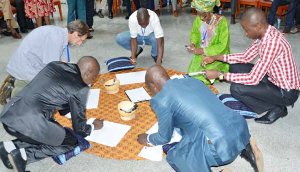Three national open space conferences explore ways forward after the Ebola crisis
In February/March 2016, three national Open Space Conferences took place in Guinea, Liberia and Sierra Leone. Stakeholders from government, civil society, religious, traditional and development organisations used this unique format to discuss how their countries’ health systems could be improved.
“Identify the main challenges of your post-Ebola health situation and then find solutions” – this challenging task was given to the 463 participants who had been invited to Open Space Conferences in the three post-Ebola countries Guinea, Liberia and Sierra Leone. In different group formats they were asked to discuss how communities could contribute to such solutions in collaboration and as a complement to their governments’ efforts.
Commissioned by the German Ministry for Economic Cooperation and Development (BMZ) the German Institute for Medical Mission (DIFAEM) organized these conferences and the Berlin-based MediationsGemeinschaft (meGem) facilitated them.
How did the Open Space conferences work?
The Open Space Conference methodology is a participatory approach that activates existing knowledge and capacities instead of relying on external inputs and teaching. In Guinea, Liberia and Sierra Leone, selected representatives of all participating groups came together for pre-meetings to agree on a title for their conference and to ensure that all relevant stakeholder groups were invited.

During the conferences, the participants set the agenda, brought in their own knowledge and made a case for the priorities for which they had a burning passion. They suggested the topics to be discussed in several small breakout discussion groups thereafter. After the first round of defining discussion topics, a process of prioritization was conducted to reduce the number of suggested topics to a manageable number.
During the first two days, these jointly agreed topics were discussed in depth in groups of 3-25 people. On day three of the conferences, the results were shared with the plenary and participants then chose their priority issue for further discussion and community action.
Overall, the Open Space methodology motivated and facilitated the expression of interests, the sharing of experiences of participants and the imparting of local knowledge on health and health system strengthening. All debates were documented by the participants themselves and compiled in a Book of Proceedings at the end of each Open Space Conference.
Which topics were discussed?

In all three conferences, participants were highly motivated and involved in meaningful exchange of ideas with each other. When reflecting on the challenges of each national health system, participants in all countries identified the responsibilities of their government and underlined the current short-comings and resulting needs. At the same time, they stressed that communities should be provided with opportunities to participate more in health system governance. Discussions focussed on access to and quality of health services, the health workforce situation including the conditions of service, loss of confidence in the health system, challenges related to infection prevention and control, the management of emergency situations, the needs of vulnerable groups and the optimal form of health education.
There were similarities with respect to solutions in Guinea, Liberia and Sierra Leone. Some differences appeared regarding the possible dimensions of community contributions. While water, sanitation and hygiene (WASH) appeared to be highly important for general community life in Sierra Leone, it was discussed only in the context of health facilities in Guinea and Liberia. The services of community health volunteers and traditional medicine practitioners were not so central in Guinea, while important in the other two countries. Female genital mutilation (FGM) and management of caesarean sections were only discussed in Guinea. Only Liberian and Sierra Leonean participants felt that communities would be able and willing to help with the construction of health infrastructure by, for example, contributing their own work, land, building materials or security services.
Leveraging the power of community involvement
The three conferences showed that there is a need for further operational research on, and support with, community participation, health system governance, the setting up of an effective health workforce, and the establishment of uninterrupted infection prevention and control measures, including measures addressing trans-border health. They also showed that none of these issues could be tackled successfully without active community involvement.
The process of rebuilding and strengthening the post-Ebola health systems of Guinea, Liberia and Sierra Leone needs to leverage the force of community contributions. The Open Space Conferences have shown that energy and interest are unlimited if and when people have the feeling that their views and ideas count.
Read the full report in English or French
- How can the health systems of Guinea, Liberia and Sierra Leone be improved? (DIFÄM, 2016)
- Comment les systèmes de santé de la Guinee, du Libéria et de la Sierra Léone peuvent etre ameliorés? (DIFÄM, 2016)
August 2016

